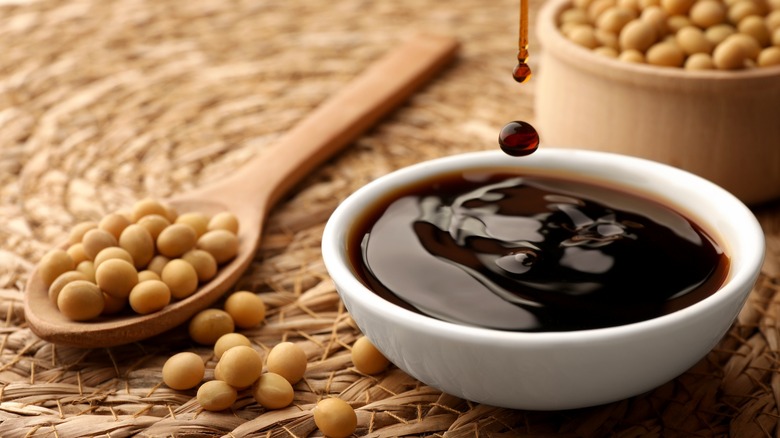The Best Substitute For Soy Sauce In A Pinch
Soy sauce is an utterly complex liquid that hits all the flavors that make up the basic five tastes — aka sweet, sour, salty, bitter, and umami. Made from soybeans, wheat, and saltwater brine, and fermented with the help of koji, every last drop of the runny brown liquid bursts with a rich, savory, and salty flavor. Adding soy sauce to a dish can sharpen its flavors but also balance them — it can tie various components together but also create contrast, and it can mask excessive saltiness by giving the dish a savory depth. Safe to say, replacing soy sauce isn't always easy; it requires an equally punchy ingredient that can match its complex flavor profile.
One liquid that lives up to soy sauce's rich umami flavor is Worcestershire sauce. Much like soy sauce, Worcestershire is a fermented condiment, but it's made from vinegar and molasses, which is then flavored with anchovies, tamarind, and aromatics like garlic and ginger. Fermentation gives Worcestershire the same savory, umami quality and dark hue as soy sauce, except it has less sodium in it yet more tang and spice. Soy sauce can be substituted with Worcestershire sauce in equal proportions as long as it's being used for its flavor rather than its saltiness. As a bonus, some Worcestershire lack soy and gluten, which makes it a possible soy sauce substitute for those who have specific intolerances.
Balsamic vinegar is a vegan soy sauce substitute
While Worcestershire matches the rich complexity of soy sauce, the anchovies present in it make the sauce unsuitable for vegetarians and vegans. In such cases, balsamic vinegar will rise to the occasion — though make sure to give the ingredients a once-over as not all varieties are always vegan. The dark vinegar can be used to replace soy sauce in equal measure, so as long as the soy sauce isn't the star of the dish — think marinades and salad dressings where the sauce is one of several components. You may also need to adjust the salt in your recipe to make up for the lack of sodium from soy sauce.
Miso paste is another vegan soy sauce substitute worth considering. Both share similar ingredients — aka soybeans, salt, and koji — both are fermented, and both have that salty, savory, umami flavor that brings depth to a recipe. The only difference is that while balsamic is a liquid like soy sauce, which makes it a convenient substitute, miso often comes in the form of a paste. Additionally, you'll need twice the amount of miso paste as soy sauce that the recipe calls for. Even then, it's best to always mix it with water into a smooth liquid first and use it in recipes where the miso can cook, like in warm soups and broths.
More substitutes for soy sauce
If the presence of fish is not a problem, there are several other alternatives that could substitute soy sauce in a pinch. Take fish sauce, for example. Made by salting anchovies and then letting them ferment for as long as two years, fish sauce also has the umami complexity of soy sauce thanks to the process of fermentation. That said, fish sauce does have a pungent and saline flavor, so it's best to only add it in small quantities. Add one-third amounts of fish sauce for the soy sauce in your recipe and consider mixing it with some lemon juice to balance its piscine flavor.
Oyster sauce is another excellent alternative — though it does have a thicker consistency than soy sauce. While it can be used in equal proportions to substitute soy, there are a few things to bear in mind. Oyster sauce contains sugar on top of salt, so it's best to tweak any additional sugar that you add to your recipe. Plus, where soy sauce has an umami depth to it, oyster sauce has a more straightforward sweet and salty flavor without the piscine salinity of fish sauce. If you're out of liquids such as Worcestershire, balsamic vinegar, and oyster sauce, even just a few chopped anchovies can come to the rescue. Anchovies will bring a similar savory depth to cooked recipes where the little chopped bits of fish have a better chance of melting in.



